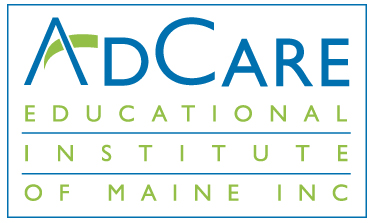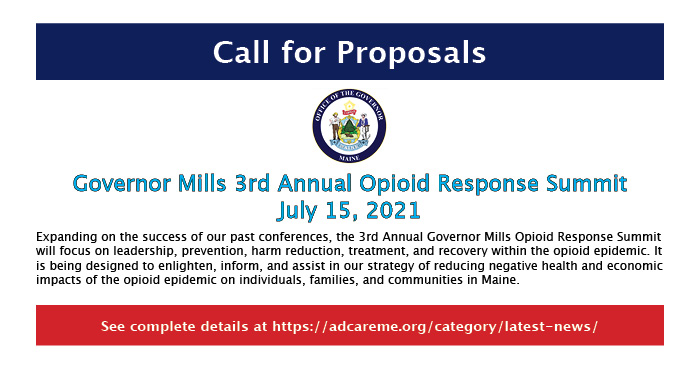3rd Annual Governor Mills Opioid Response Summit, July 15th, 2021
Call for Proposals
Expanding on the success of our past conferences, the 3rd Annual Governor Mills Opioid Response Summit will focus on leadership, prevention, harm reduction, treatment, and recovery within the opioid epidemic. It is being designed to enlighten, inform, and assist in our strategy of reducing negative health and economic impacts of the opioid epidemic on individuals, families, and communities in Maine.
The Summit Planning Committee invites you to submit a proposal. We will be accepting presentations on a wide variety of topics to best meet the interests and learning needs of our attendees. Proposals from individuals and panels will be accepted. Multidisciplinary panels are encouraged and could include perspectives from medical professionals, treatment providers, researchers, law enforcement or criminal justice personnel, people in recovery, people in active use; as well as, people engaged in prevention, recovery, and harm reduction support services. Proposals focused on original research, program and policy evaluations, innovative practices, and actionable data are welcome.
While an in-person event is contemplated, public health considerations will be the priority. The Summit Planning Committee will make an announcement no later than March 19th if the circumstances warrant a virtual conference.
Presentation Topics:
Presentations on any topic related to opioid and stimulant use disorder will be considered, but preference will be given to the following topics:
Intervention
- Improving access to Medication Assisted Treatment. (Examples: increasing acceptance within healthcare providers, corrections communities, AA and other recovery programs)
- Recovery outcomes with longstanding buprenorphine and/or methadone use
- Bridging the gap between Primary Care and SUD Specialty Care
- Tapering Medications
- Pain Management alternatives to opiates
- Pregnant and postpartum women living with SUD, and substance exposed infants
- Culturally specific treatment, recovery supports
- Recovery and Treatment Courts
- Community and law enforcement diversion programs
- Public Education/Health Promotion Campaigns
- Evidence based implementation strategies
Prevention
- Reducing prescribed and illicitly obtained opioids
- Prevention of early use and reducing child/youth exposure to addictive substances
- Adverse Childhood Experiences (ACEs) link with SUD
- Preventing intergenerational cycles of problematic substance use
- Trauma Intervention Models and SUD outcomes
- Evidence Based Education and Prevention Programs
- Social Determinants of Health: Interrelationship between Economic & Social Conditions and Substance Use
- Education on teaching/promoting healthy relationship with substances
- Impacts of substance use on children (opioids, tobacco, alcohol, cannabis, other)
Building and Supporting Recovery-Ready Communities
- Expanding community partnerships
- Engaging youth, families, and communities
- Positive or negative media influence
- OUD and marginalized communities (Veterans, LGTBQ, BIPOC communities)
- Familial effects and work within the social and foster services
- Recovery friendly employment Identification of Need, Employer Support & Job Readiness
- Recovery Housing
- Recovery Coaching
- OUD in rural communities
- Elements of a Recovery Ready Community, Recovery Ready Campus
- The role of a recovery community center is responding to the opioid epidemic
Harm Reduction
- Effects of harm reduction strategies on population health
- Role of syringe service programs in public health response
- Naloxone distribution
- Safe use and safe supply as a harm reduction strategy
- HIV/AIDS, Hepatitis, and other infectious disease control and prevention
- Effectiveness and legality of overdose prevention sites
Data as a Call to Action
- Maine population level trends on prevalence, incidence, treatment
- Emerging data trends and their implications for practice and policy
Breakout Session Available Formats (45-60min presentation blocks):
Traditional: Classroom style sessions with time for Q&A at the end of the session.
Workshop: Workshop sessions are interactive and experiential sessions designed to give learners an in-depth understanding of a specific clinical or “how to implement” topic. Workshop sessions use a variety of teaching formats, such as small group discussion, case-examples, demonstrations, worksheets, and other skill-building exercises.
Panel Presentation: Speaker Panel, most often with moderator, that covers a topic or program implementation with Q&A at the end of the Session. No more than 5 individuals, including moderator will be accepted.
Poster Presentation: Both electronic and Paper Formats will be required and should present information with brief text and multiple visuals, such as graphs, tables, and/or pictures, that does not require verbal explanation. Posters offer an opportunity to share research and evaluation in progress or with preliminary outcomes, training/program implementation, and educational materials.
*Please note, sufficiently scoring proposals may be offered a Poster Presentation if the submitted format cannot be accommodated.
Important Dates:
Presentation Submission Deadline: Sunday, March 6th, 2021 (11:59pm)
Presentation Decision Notification: Friday, April 16th, 2021
CME Document Deadline: TBD
Poster Decision Notification: Friday April 16th, 2021
Please do not submit a proposal if you are not confident that you will be able to attend the conference and deliver the presentation. Cancellations impose a significant burden on the development of the conference program and may negatively impact the overall quality of the program.
Presenters of accepted presentations or posters will receive free registration on the day of their presentation. In the event of a multi-day Summit, additional days may be purchased at your own expense.
Presentation Formatting: Using 12 point font in a Word document please include the following:
- Presentation Title
- Presenter name(s), email address(es), and affiliation(s), short bio(s)
- Preferred presentation/Breakout Session Format (Traditional, Workshop, Panel, Poster)
- Learning Objectives: at least one measurable objective
- Target Audience(s)
Abstract text of less than 500 words to include:
- Introduction/Short Description of the Presentation
- Background of the problem and potential intervention, program, or policy
- Methods – design of the study, program, or analysis
- Results – describes the outcome(s)
- Conclusion – discuss the implication of the results for practice, policy, or how they will impact communities in Maine
Review Criteria: Proposals will be scored by a team of subject matter experts from the provider, research, policy, and recovery communities based on responsiveness to requested topics, clarity and coherence of writing, and quality and completeness of information/supporting data.
Presentation Submission: Please send completed Abstracts to the Summit Planning Committee at: opioidsummit@maine.gov Questions may also be directed to this email address.

